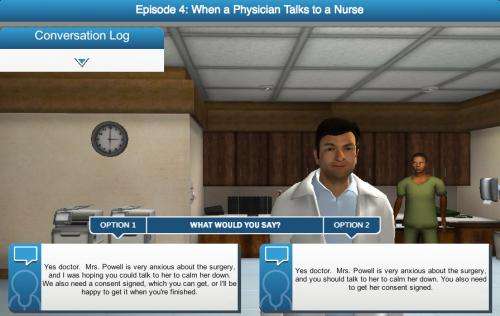Innovative gaming research gains national recognition

Television shows have been using tension between hospital personnel as compelling drama for years. But, in the real world, misunderstandings and miscommunication in the healthcare environment can cause errors with long-lasting, even fatal consequences.
With that in mind, researchers at the University of Texas at Arlington College of Nursing, Baylor Scott & White Health and UT Dallas developed a video-game simulation that they say can teach doctors and nurses to work more collaboratively by playing out tense situations in a virtual world.
The federally funded project recently received two national awards at the 4th Annual Serious Games and Virtual Environments Arcade & Showcase during the 2014 International Meeting on Simulation in Healthcare in San Francisco. The honors included a Best-in-Show award for the Academic Faculty Category and a 4th place award in the Technology Innovations division.
"Our hope is that this project will enhance patient safety and, ultimately, improve patient outcomes," said Beth Mancini, a UT Arlington nursing professor and Associate Dean of the College of Nursing. "Being honored by the judges at this year's International Meeting on Simulation in Healthcare tells us that the virtual learning environment we've built is among the very best in terms of content and design."
Mancini is principal investigator for a nearly $1 million grant from the U.S. Agency for Healthcare Research and Quality that funds GLIMPSE, or a "Game to Learn Important Communications Methods for Patient Safety Enhancement
Mancini's partners in the research were Baylor Scott & White Health's Dr. Yan Xiao, director of patient safety research, and Susan
Houston, director of nursing research at the hospital, as well as University of Texas at Dallas' Marjorie Zielke. Zielke is director of the UT Dallas Arts and Technology program's Virtual Humans and Synthetic Societies Lab.
Before the team could build a game for doctors and nurses to play as part of the research, they had to recruit actual health care practitioners to provide feedback about positive and negative workplace communications experiences. Xiao said participation by Baylor nurses and physicians was key to that step and hailed the Baylor team as "some of the most insightful communicators for patient safety and optimal patient experience."
Louann Cole, the health services researcher at Baylor who served as the study's project manager, added: "I cannot stress the importance of our Baylor physicians and nurses and the important role they had in this game. They were so candid. It was a wonderful experience."
After the game was built, the team began evaluating doctors' and nurses' knowledge on effective communication strategies, inviting them to play the game in the role of doctor and the role of nurse, and then evaluating participants afterward to see if the game helped their knowledge. That data gathering is ongoing.
Organizers of the contest at the International Meeting on Simulation in Healthcare, which was held in January, compiled a field of sophisticated competition entries that combined teaching and gaming technology. Zielke said the contest judges' recognition is deeply appreciated.
"The overall track record we have with our game-based simulations and the international recognition we are receiving is very gratifying, particularly when the subject matter is as challenging as it is in GLIMPSE," Zielke said. "As always, we owe our continuing success to the project team and the great faculty, staff, and students involved in these important research projects. The encouragement and support we get from our administration is also critical."
Provided by University of Texas at Arlington